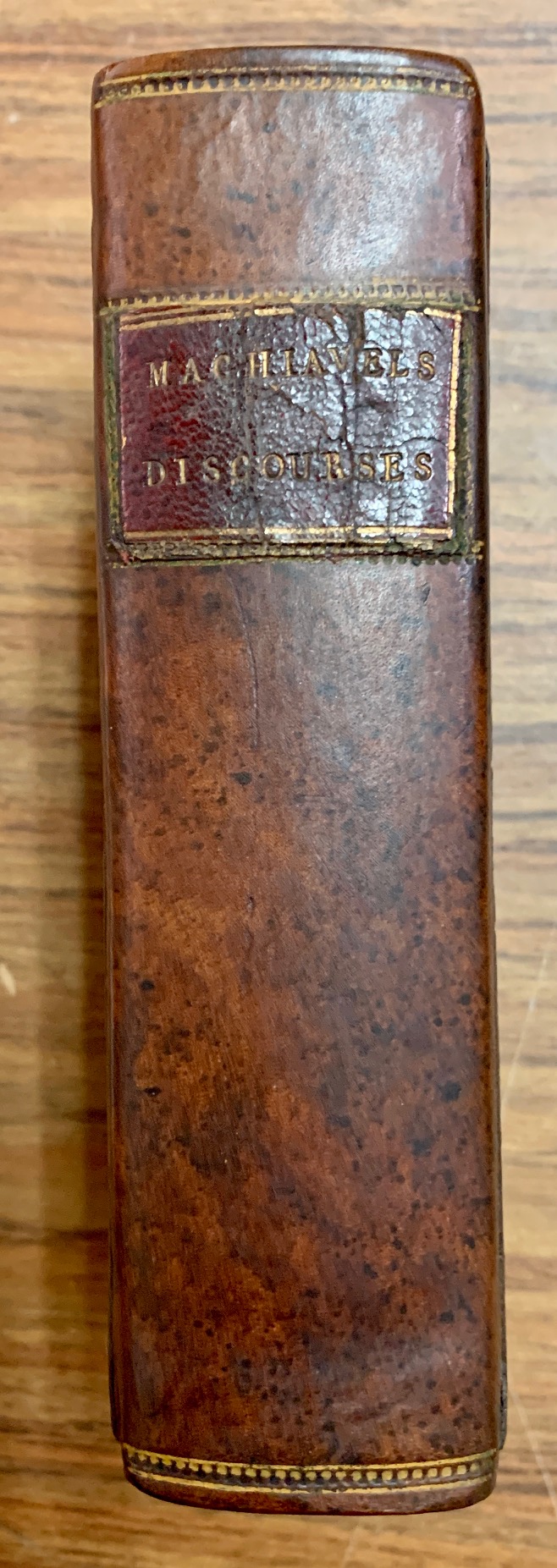Sale 2549 - Lot 88
Additional Images



3



Sale 2549 - Lot 88
Estimate: $ 800 - $ 1,200
Machiavelli, Niccolò (1469-1527)
Machiavels Discovrses upon the First Decade of T. Livius Translated out of the Italian.
London: Printed by Thomas Paine for William Hills and Daniel Pakeman, 1636.
First edition in English, 12mo, A2-12, (a)12, B2-12, (B1 cancelled), C-Z12, Aa-Dd12, Ee11 (lacking A1 & Ee12, first and last blanks); translated by Edward Dacres, who also translated The Prince; with "animadversions" in italics on the title; bound in original sprinkled English calf, rebacked, 5 3/4 x 3 1/4 in.
STC 17160; ESTC S109049; Bibliografia Machiavelliana [17th century] 35; http://estc.bl.uk/S109049; PMM 63.
"Machiavelli was a proper man and a good citizen; but, being attached to the court of the Medici, he could not help veiling his love of liberty in the midst of his country's oppression. The choice of his detestable hero, Cesare Borgia, clearly enough shows his hidden aim; and the contradiction between the teaching of The Prince and that of the Discourses on Livy and the History of Florence shows that this profound political thinker has so far been studied only by superficial or corrupt readers. The Court of Rome sternly prohibited his book. I can well believe it; for it is that Court it most clearly portrays." (Jean-Jacques Rousseau, The Social Contract, Book III)
Machiavels Discovrses upon the First Decade of T. Livius Translated out of the Italian.
London: Printed by Thomas Paine for William Hills and Daniel Pakeman, 1636.
First edition in English, 12mo, A2-12, (a)12, B2-12, (B1 cancelled), C-Z12, Aa-Dd12, Ee11 (lacking A1 & Ee12, first and last blanks); translated by Edward Dacres, who also translated The Prince; with "animadversions" in italics on the title; bound in original sprinkled English calf, rebacked, 5 3/4 x 3 1/4 in.
STC 17160; ESTC S109049; Bibliografia Machiavelliana [17th century] 35; http://estc.bl.uk/S109049; PMM 63.
"Machiavelli was a proper man and a good citizen; but, being attached to the court of the Medici, he could not help veiling his love of liberty in the midst of his country's oppression. The choice of his detestable hero, Cesare Borgia, clearly enough shows his hidden aim; and the contradiction between the teaching of The Prince and that of the Discourses on Livy and the History of Florence shows that this profound political thinker has so far been studied only by superficial or corrupt readers. The Court of Rome sternly prohibited his book. I can well believe it; for it is that Court it most clearly portrays." (Jean-Jacques Rousseau, The Social Contract, Book III)





